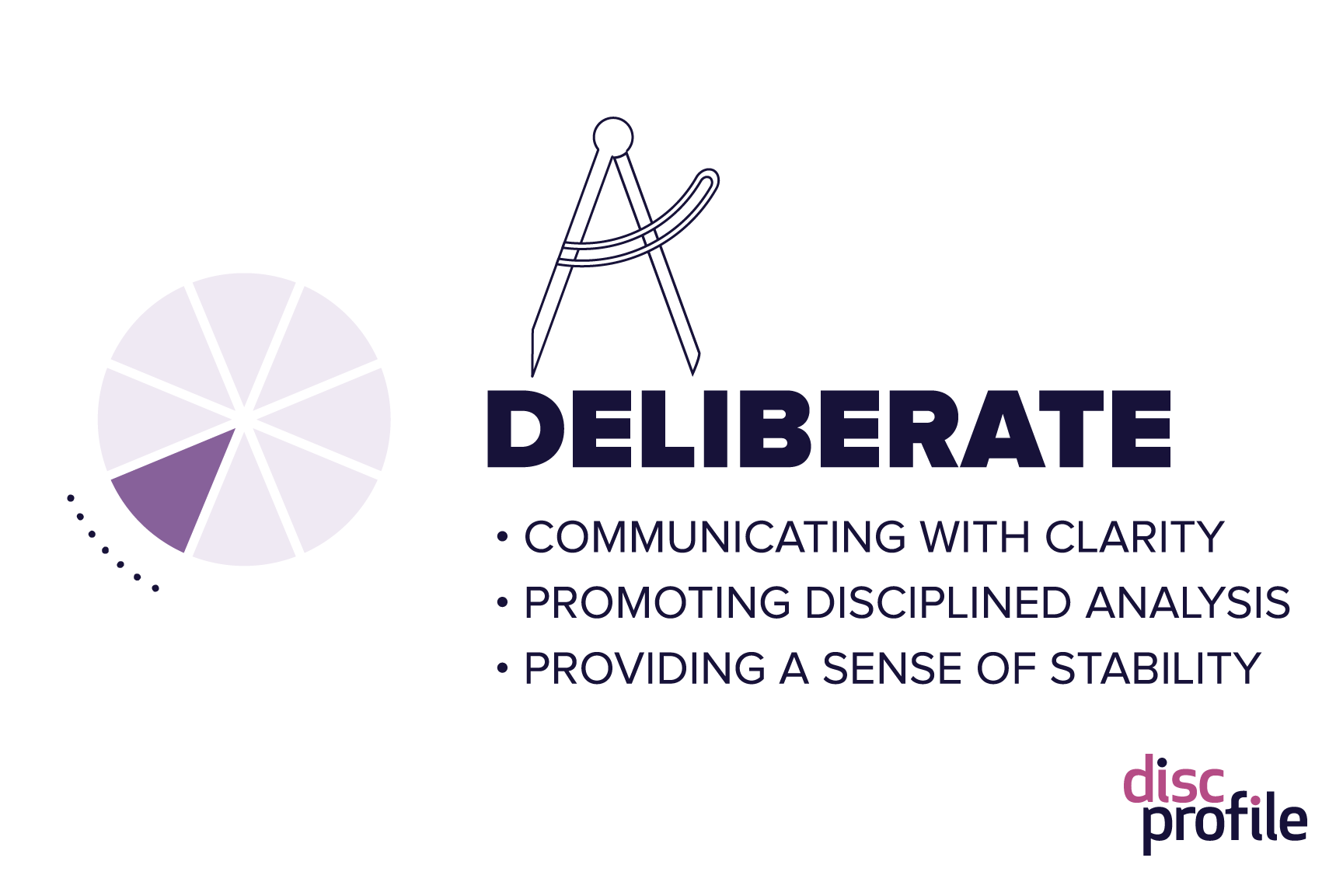Deliberate Leaders: DiSC C Style Leadership
Key Takeaways
- Deliberate leaders align with the C style in the Everything DiSC® model of leadership.
- People with a deliberate leadership style are often systematic, cautious, and analytical when leading.
- Every type of leader can learn from deliberate leaders how to deliver a clear message, make informed choices, and invest in processes.
The Everything DiSC model is well-suited to leadership development. Learners can understand their natural leadership style and identify areas for growth. In addition, knowledge of all eight types of DiSC leadership gives leaders more options for responding to different situations.
The deliberate leadership style
Deliberate leaders are most comfortable working at a disciplined and moderate pace. They ensure accuracy in their craft or profession. A C-style leader seeks a reputation as an expert in their field.
People with a deliberate personality can also be overly risk-averse and perfectionist. They can be demanding of their followers, paying less attention to employees' needs than more inclusive and affirming leaders.
Deliberate leaders like their privacy, and you’re unlikely to see them show emotions or be vulnerable. You probably will notice their desire to be objective, their reliability, and their organizational skills. You probably appreciate the clarity of their communications and think they’re good at making decisions.

Strengths of deliberate leaders:
- They’re determined to get things done right.
- They’re often able to separate emotions from facts.
- They take the time to create systems and structures.
- They’re not afraid to question ideas that seem illogical.
- They’re comfortable working on their own.
- They’re able to work tirelessly to solve problems.
- They usually provide solid evidence for their arguments.
Goals of deliberate leaders:
- Accuracy
- Objective processes
Areas for improvement:
- Acknowledging others’ feelings
- Looking beyond data
Source: The 8 Dimensions of Leadership
Daniel Goleman in The Focused Leader, Harvard Business Review
What can we learn from deliberate leaders?
Organizations need deliberate leaders to deliver well-crafted products or services. Colleagues rely on them to create an environment where everyone knows what to expect. Deliberate leaders can find their way through ambiguity and into processes and systems that work.
Here are some lessons people of every leadership style can learn from deliberate leaders.
1. People can’t read your mind
Being social and friendly isn’t the same as being a great communicator. Deliberate leaders make it clear where they stand and share the logic behind their arguments.
C-style leaders are willing to take the time to form and deliver a clear message. They are not so excited by a new idea that they forget to include others. They make sure to bring others into the loop when something might change.
A deliberate leadership style helps people feel they are all headed in the same direction. This is especially important when there's confusion over a major change, or when a new initiative demands alignment. People are less likely to feel left behind because deliberate leaders give them the details that matter.
Larry Bossidy and Ram Charan, Execution: The Discipline of Getting Things Done
2. Show that you’ve done your homework
Deliberate leaders might have been the first to recognize and capitalize upon the power of analytics. Unlike the faster-paced leaders who sometimes skip past disciplined analysis, this type of leader digs in. Showing that they’ve made careful and informed choices builds their credibility.
Enthusiasm can sell some people on an idea or drum up interest, but it won’t be enough for many. Some people have been burned by leaders who repeatedly made false starts, and some are naturally skeptical. Focusing your energy, gathering information, and then explaining it will show you’ve done your due diligence. You'll inspire confidence in your decisions.
John Kotter, in What Leaders Really Do, Harvard Business Review
3. Leaders are responsible for ensuring that processes run smoothly
Deliberate leaders seldom overlook their responsibility for the inner workings of their organization. In contrast, leaders with D, Di, or iD styles may neglect processes while rushing ahead toward something new.
Leaders with deliberate personalities consciously create an environment and culture through structure and processes. They tend not to ignore issues like succession planning, regulatory reporting, or data security. They might delegate many related tasks, but they don’t abandon their responsibility for them.
Most people don’t like to waste time because of unclear expectations or procedures. They want to know what their leader will hold them accountable for. Also, they want to see others held accountable.
Deliberate leaders are willing to put in the time to study current processes to learn what is and what isn’t working. They will dig to discover the source of downtimes, low morale, high turnover, damaged brand reputation, or whatever issue they face.
Great leaders are able to be both nearsighted and farsighted. Deliberate leaders tend to be better with the closer picture.
Jim Kouzes and Barry Posner, The Leadership Challenge
Growth opportunities for DiSC C-style leaders
Displaying emotion
People with other styles sometimes describe deliberate leaders as detached, aloof, or private. Their desire for freedom and privacy can cause them to shy away from the emotional aspects of leadership.
This can mean that these leaders fail to notice or meet the emotional needs of their employees. Their silence can be mistaken for disapproval. Both offering praise and applying pressure can be uncomfortable and taxing.
Networking
C-style leaders can fail to take advantage of social situations to network and influence others. Interpersonal connections can require energy they’d rather use elsewhere. It can mean that they fail to ask others for help or for additional ways of addressing a problem.
Moving forward without all the information
Deliberate leaders are innately skeptical and questioning. They worry about the quality of anything associated with their name, so will demand logical arguments to support any suggestion. They hesitate to move ahead until they can address all their concerns. This can cause them to miss opportunities and fail to take even reasonable risks.
What is your leadership style?
Everything DiSC Work of Leaders® will reveal your DiSC leadership style and guide you through a personalized leadership skills development plan.
Related reading
People can’t read your mind
- Overcommunicating and the Curse of Knowledge, The Table Group
- Why great leaders overcommunicate, Fast Company
- 10 Leaders on How to Effectively Communicate Remotely, Entrepreneur
Show that you’ve done your homework
- How Data Can Make Better Managers, Harvard Business Review
- 6 Critical Thinking Skills That Create Great Leaders, Leaders Media
- Problem solving doesn’t have to be a puzzle, McKinsey & Company
Leaders are responsible for ensuring that processes run smoothly
- Design Your Organization to Match Your Strategy, Harvard Business Review
- How Systems Support (or Undermine) Good Decision-Making, Harvard Business Review
- How to Define Processes for Your Team (and Actually Get Things Done), Wrike
Posted 10/06/2018, Last Updated 01/10/2025







